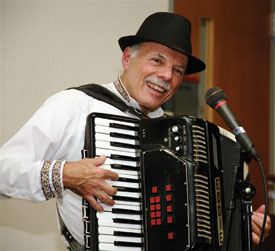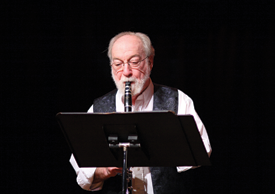Adjunct and emeritus profs make toe-tapping music on their band’s latest CD
Ed Goldberg’s Odessa Klezmer Band, which features Robert Mehlman on clarinet, has been making audiences “hetsken zich” for more than two decades.

Ed Goldberg. Photo (c) David Benjamin

Although it’s been played for centuries, klezmer music can escape definition. Not for Ed Goldberg.
“Jewish soul” is how the adjunct computer science professor and leader of the Odessa Klezmer Band describes the celebratory, instrumental dance music that originated in Eastern Europe and is enjoying a resurgence in the U.S.
“The roots of klezmer go through many different countries, but the music has a common thread of Jewishness to it,” said Goldberg, who said he grew up listening to it. “It’s in my system.”
Goldberg’s band, which features Professor Emeritus Robert Mehlman on clarinet, has been making audiences hetsken zich for more than 20 years, playing klezmer favorites as well as Eastern European, Latino, and Middle Eastern tunes. The band’s new CD, Live at Jazz Vespers, features everything from freilachs to polkas.
“It really gives you an idea of the breadth of the band and the kind of stuff we play live,” said Mehlman.
Goldberg said he was exposed to a wide variety of musical genres, particularly klezmer, while growing up. The quadruple-instrument threat—he plays piano, bass, vibes, and accordion—began performing professionally in high school, and since then has toured with numerous bands, played on more than 150 albums, won a Grammy, and appeared at Carnegie Hall five times. He joined Odessa in 1984, taking over the reins when the original leader left a few years later “I kept it going, never knowing where it would lead,” he said. Twenty years later, the group plays weekly shows across the tri-state region and sells CDs to fans as far away as Asia.

A serendipitous computer problem brought Mehlman into the fold 12 years ago. When his office desktop crashed, the tech who came to fix it happened to be Goldberg’s daughter, Sharon. “She needed my password, which happened to be klezmer related,” recalled Mehlman. “She mentioned her father had a klezmer band and asked what instrument I played. I said, ‘Clarinet,’and she said, ‘my dad is looking for a clarinetist. You should call him.’” Mehlman did, and Goldberg invited him to sit in on that afternoon’s gig. “I went there, we rehearsed for 15 minutes, and then went on stage. We’ve been playing together ever since,” said Mehlman.
Like Goldberg, Mehlman has been a fan of klezmer since childhood, and said he recalls listening to it on WEVD, an old Yiddish station, every time he visited his grandparents. He took up the clarinet at age 6 and played throughout high school (even sharing the stage with classmate and fellow clarinetist Allen Konigsberg, better known today as Woody Allen), college, and a stint in the army. He stopped performing for 25 years after being discharged, but eventually returned and has since played with two international groups.
The uncle who trained Mehlman as a classical clarinetist didn’t want his pupil playing klezmer. “He called it ‘cheap music,’” the retired English and counseling professor recalled. “Klezmer was once a derogatory term. If your daughter was going out with a klezmer, that meant she was going out with a bum.”
Ironically, Mehlman’s contributions are the key to Odessa’s klezmer sound.
“The clarinet gives the quirks, the different inflections, the in-between tones—that’s what makes klezmer music,” said Goldberg. “Without Bob, we’d just be a bunch of musicians playing Jewish music.”
The two are equally excited about the band’s new CD, which was recorded during a show in Cape May, New Jersey. “Every once in a while, one of those evenings catches fire and everybody is on the same wavelength,” said Mehlman. “It was a memorable concert.”
Click here to visit Odessa Klezmer Band’s website and listen to samples of their music.
Posted on October 31, 2011

